

Emotivism. In the 1950s, emotivism appeared in a modified form in the universal prescriptivism of R.
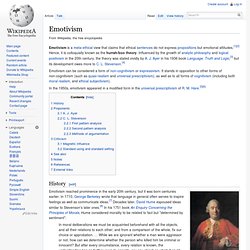
M. Hare.[5][6] History[edit] David Hume's statements on ethics foreshadowed those of 20th century emotivists. Emotivism reached prominence in the early 20th century, but it was born centuries earlier. In moral deliberations we must be acquainted beforehand with all the objects, and all their relations to each other; and from a comparison of the whole, fix our choice or approbation. … While we are ignorant whether a man were aggressor or not, how can we determine whether the person who killed him be criminal or innocent? The emergence of logical positivism and its verifiability criterion of meaning early in the 20th century led some philosophers to conclude that ethical statements, being incapable of empirical verification, were cognitively meaningless.
R. Cultural relativism. Compare moral relativism, aesthetic relativism, social constructionism, and cognitive relativism.
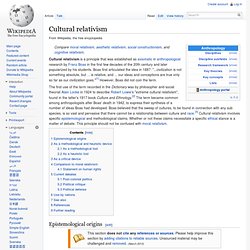
Cultural relativism is a principle that was established as axiomatic in anthropological research by Franz Boas in the first few decades of the 20th century and later popularized by his students. Boas first articulated the idea in 1887: "...civilization is not something absolute, but ... is relative, and ... our ideas and conceptions are true only so far as our civilization goes. "[1] However, Boas did not coin the term. Epistemological origins[edit] Consequentialism. Consequentialism is usually distinguished from deontological ethics (or deontology), in that deontology derives the rightness or wrongness of one's conduct from the character of the behaviour itself rather than the outcomes of the conduct.
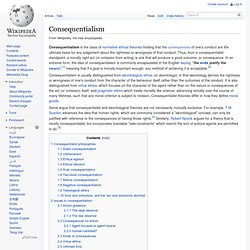
It is also distinguished from virtue ethics, which focuses on the character of the agent rather than on the nature or consequences of the act (or omission) itself, and pragmatic ethics which treats morality like science: advancing socially over the course of many lifetimes, such that any moral criterion is subject to revision. Consequentialist theories differ in how they define moral goods. Some argue that consequentialist and deontological theories are not necessarily mutually exclusive.
For example, T.M. Axiology. History[edit] Between the 5th and 6th century B.C., it was important in Greece to be knowledgeable if you were to be successful.
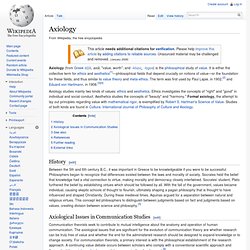
Philosophers began to recognize that differences existed between the laws and morality of society. Socrates held the belief that knowledge had a vital connection to virtue, making morality and democracy closely intertwined. Socrates' student, Plato furthered the belief by establishing virtues which should be followed by all. Aesthetics. "Aesthetician" redirects here.

For a cosmetologist who specializes in the study of skin care, see Esthetician. More specific aesthetic theory, often with practical implications, relating to a particular branch of the arts is divided into areas of aesthetics such as art theory, literary theory, film theory and music theory. An example from art theory is aesthetic theory as a set of principles underlying the work of a particular artist or artistic movement: such as the Cubist aesthetic.[6]
Trivium. In medieval universities, the trivium comprised the three subjects that were taught first: grammar, logic and rhetoric.
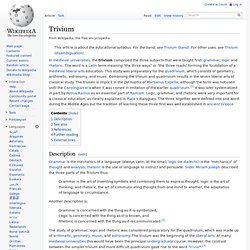
The word is a Latin term meaning "the three ways" or "the three roads" forming the foundation of a medieval liberal arts education. This study was preparatory for the quadrivium, which consists of geometry, arithmetic, astronomy, and music. Combining the trivium and quadrivium results in the seven liberal arts of classical study. Consequentialism. Meaning of life. Questions Questions about the meaning of life have been expressed in a broad variety of ways, including the following: What is the meaning of life?
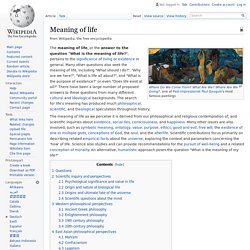
What's it all about? Who are we? [1][2][3] Philosopher in Meditation (detail) by RembrandtWhy are we here? These questions have resulted in a wide range of competing answers and arguments, from scientific theories, to philosophical, theological, and spiritual explanations. Scientific inquiry and perspectives Many members of the scientific community and philosophy of science communities think that science can provide the relevant context, and set of parameters necessary for dealing with topics related to the meaning of life. Psychological significance and value in life. Existence precedes essence. The idea can be found in the works of philosopher Søren Kierkegaard in the 19th century,[4] but was explicitly formulated by philosopher Jean-Paul Sartre in the 20th century.

The three-word formula originated in his 1946 lecture "Existentialism Is a Humanism",[5] though antecedent notions can be found in Heidegger's Being and Time.[6] Sartre's close confidant Simone de Beauvoir also uses this concept in her feminist existentialism to develop the idea that "one is not born a woman, but becomes one". Sartre's view[edit] The sartrean claim is best understood in contrast to an established principle of metaphysics[dubious ] that essence precedes existence, i.e. that there is such a thing as human nature, determined by the cosmic order (or a god), laid down by religious tradition, or legislated by political or social authority. A typical claim for this traditional thesis would be that man is essentially selfish, or that he is a rational being.
See also[edit] Søren Kierkegaard. Søren Aabye Kierkegaard (/ˈsɔrən ˈkɪərkəɡɑrd/ or /ˈkɪərkəɡɔr/; Danish: [ˈsɶːɐn ˈkiɐ̯ɡəɡɒːˀ] ( )) (5 May 1813 – 11 November 1855) was a Danish philosopher, theologian, poet, social critic, and religious author who is widely considered to be the first existentialist philosopher.[5] He wrote critical texts on organized religion, Christendom, morality, ethics, psychology and philosophy of religion, displaying a fondness for metaphor, irony and parables.
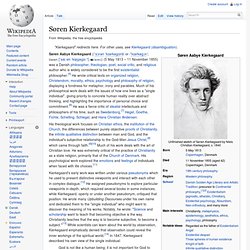
Much of his philosophical work deals with the issues of how one lives as a "single individual", giving priority to concrete human reality over abstract thinking, and highlighting the importance of personal choice and commitment.[6] He was a fierce critic of idealist intellectuals and philosophers of his time, such as Swedenborg,[7] Hegel, Goethe, Fichte, Schelling, Schlegel, and Hans Christian Andersen. Early years (1813–1836)[edit] Kierkegaard in a coffee-house, an oil sketch by Christian Olavius, 1843. Absurdism. Pelagius. A 17th century Calvinist print depicting Pelagius.
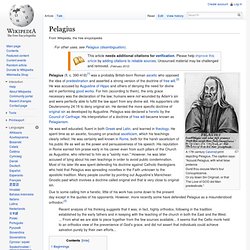
The caption says: "Accurst Pelagius, with what false pretence Durst thou excuse Man's foul Concupiscence, Or cry down Sin Originall, or that The Love of GOD did Man predestinate. " Pelagius (fl. c. 390-418)[1] was a probably British-born Roman ascetic who opposed the idea of predestination and asserted a strong version of the doctrine of free will.[2] He was accused by Augustine of Hippo and others of denying the need for divine aid in performing good works. For him (according to them), the only grace necessary was the declaration of the law; humans were not wounded by Adam's sin and were perfectly able to fulfill the law apart from any divine aid. His supporters cite Deuteronomy 24:16 to deny original sin. He denied the more specific doctrine of original sin as developed by Augustine.
Spinozism. Spinozism (also spelled Spinoza-ism or Spinozaism) is the monist philosophical system of Baruch Spinoza which defines "God" as a singular self-subsistent substance, with both matter and thought being attributes of such. History[edit] French philosopher Martial Guéroult suggested the term "Panentheism", rather than "Pantheism" to describe Spinoza’s view of the relation between God and the world. The world is not God, but it is, in a strong sense, "in" God. Not only do finite things have God as their cause; they cannot be conceived without God.[3] In other words, the world is a subset of God. Anthropocentrism. Is–ought problem. The is–ought problem in meta-ethics as articulated by Scottish philosopher and historian David Hume (1711–76) is that many writers make claims about what ought to be on the basis of statements about what is. However, Hume found that there seems to be a significant difference between descriptive statements (about what is) and prescriptive or normative statements (about what ought to be), and it is not obvious how one can get from making descriptive statements to prescriptive.
The is–ought problem is also known as Hume's law and Hume's Guillotine. A similar though distinct view is defended by G. Dualism. Pantheism. Pantheism is the belief that the universe (or nature as the totality of everything) is identical with divinity,[1] or that everything composes an all-encompassing, immanent God.[2] Pantheists thus do not believe in a distinct personal or anthropomorphic god.[3] Some Eastern religions are considered to be pantheistically inclined. Definitions[edit] Pantheism is derived from the Greek roots pan (meaning "all") and theos (meaning "God"). Baruch Spinoza. Platon. Kritik af sofismen[redigér | redigér wikikode] Et gennemgående tema er kritikken af sofismen. Platon kritiserer deres relativistiske synspunkter, og udvikler herunde flere af argumenter, der stadigt anvendes.
Metaphysics. Logical positivism. Socratic method. Reductio ad absurdum. Reductio ad absurdum (Latin: "reduction to absurdity"; pl.: reductiones ad absurdum), also known as argumentum ad absurdum (Latin: argument to absurdity), is a common form of argument which seeks to demonstrate that a statement is true by showing that a false, untenable, or absurd result follows from its denial,[1] or in turn to demonstrate that a statement is false by showing that a false, untenable, or absurd result follows from its acceptance. First appearing in classical Greek philosophy (the Latin term derives from the Greek "εις άτοπον απαγωγή" or eis atopon apagoge, "reduction to the impossible", for example in Aristotle's Prior Analytics),[1] this technique has been used throughout history in both formal mathematical and philosophical reasoning, as well as informal debate.
Moral relativism. Relativism.